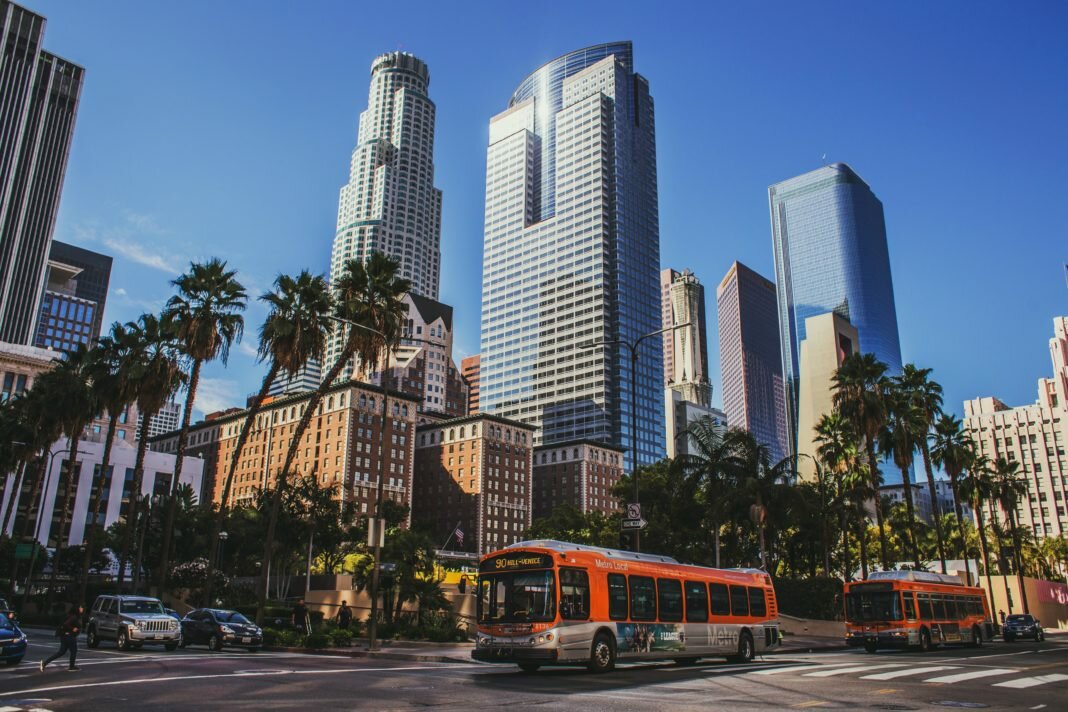Brief • 3 min Read

The COVID-19 pandemic has had widespread effect on Americans’ everyday lives, especially those that live in densely populated, urban areas. No longer satisfied with waiting out the pandemic indoors, many city dwellers have chosen to move to new homes outside their city. Such rapid suburban flight has encouraged many to proclaim that American cities will have a diminished standing after the pandemic. However, urban dwellers appear to feel differently about the future of their cities.
A study by The Harris Poll and the Chicago Council on Global Affairs in November 2020, surveying residents of the Los Angeles metropolitan area on their attitudes about urban and suburban life, reveals that although the pandemic has negatively impacted big city living, residents are still hopeful about the future of their city.
Urban Living Rivaled by Allure of Suburbia
Although most residents would prefer to live in a city, for a significant portion of L.A. residents, suburban living is appealing. Asked hypothetically where they would choose to live, 52% of residents say they would prefer to live in a city (big or small), another 40% would choose the suburbs, and only 8% would choose a rural area.*
The struggles of the COVID-19 pandemic have encouraged some residents to engage in suburban flight bur most seem unaffected. Although 20% of Los Angeles residents say their current experiences with the pandemic would make them more likely to move to a suburban area, most residents (56%) would not change where they currently live.
A Time to Address Top Local Challenges
Even if most are willing to stay put, Los Angeles residents are still concerned about several local issues. Top concerns about the city include COVID-19 (62%), the economy (38%), and taxes and fees (32%), and housing (31%).
Managing the COVID crisis
Like other coastal cities, Los Angeles was hard hit by COVID-19, especially in the pandemic’s early months. Overall, L.A. residents found state leadership and federal agencies to be more effective than their own mayor at dealing with the pandemic. Nearly half say the California’s governor (49%)** and the Centers for Disease Control and Prevention (CDC) (48%) have been very or extremely effective at addressing the COVID-19 pandemic. Only two in five residents say the same about L.A.’s mayor.***
Looking in greater depth at the city’s mayor, a noteworthy share are very dissatisfied with the mayor’s pandemic performance. Fifteen percent of all residents ay their mayor has not been not been effective at all in addressing the pandemic. Perhaps this explains why only 38% of all residents saying they are very or extremely confident in their mayor’s ability to respond to the ongoing pandemic.
Addressing the economy and standards of living
In addition to their concerns about the city’s economy, one in five L.A. area residents are concerned about economic inequality in their city. Residents are fairly divided on how well local and state government have been addressing this. Half of area residents (50%) say their mayor has been at least somewhat effective at addressing economic inequality; only 44% say the same about their state governor.
L.A. residents also show great concern about their standard of living, too. Nearly a third of area residents (31%) say they are concerned about housing in their city — higher than residents of any other metropolitan area surveyed. More than double that (71%) say the affordability of housing in their city is very or extremely important to them, too. The latter is especially important as 65% of all residents do not think their city has enough affordable housing options.
In fact, most L.A. residents (80%) would like to see more affordable housing in their neighborhoods. Of that group, the same amount support additional affordable housing options in their own neighborhoods. Despite such high support, less than half of all residents (44%) say their mayor has been at least somewhat effective at addressing affordable housing in their city. More broadly, Los Angeles was the only metropolitan area in this study where most residents did not think their mayor had been effective at addressing the local cost of housing.
This may explain why only a third (34%) of L.A. area residents want their city elected officials to take the lead on affordable housing while 58% prefer state or nationally elected officials take the lead.
It may also explain residents’ low confidence in their mayor’s ability to deal with high housing prices. Only a quarter say they are very or extremely confident in their mayor’s ability to keep housing affordable. With such high housing prices in southern California, it’s clear Los Angeles leadership has a long way to go in addressing one of the biggest elements of standard of living.
Evaluating Government Performance
Despite their low faith in local government’s ability to handle affordable housing, L.A. residents do believe that their local leadership is capable of governing effectively. Most residents agree that their city’s elected leaders are more capable of governing than the President (64%)****, Congress (61%), and state-elected officials (52%).
However, L.A. residents are more divided on how frequently their local leaders play politics. About half agree that their city’s elected officials play politics more often than Congress (49%), their state-elected officials (49%), and the President (46%).
That being said, most L.A. residents (74%) still agree that services in their city, such as sanitation, fire protection, and public transit, are sufficiently provided — though this was lower than what residents of other major metropolitan areas reported for this study.
Tackling Climate Change
Assessing government efforts
One of the most important services provided by cities is the means for transportation. However, because of the pollution that comes from both private and public transportation, the environment and human-influenced climate change have become key concerns for those living in and around large series.
The same is true for those living in Los Angeles. Just over half of all residents (54%) say cities should be doing more to combat climate change, and more than one in four L.A. residents (28%) say they are concerned about the environment and climate change in their city.
Area residents appear to approve of how local government has handled climate change so far. Most residents say their city’s parks and recreation department (59%), mayor (57%), and other county and regional officials (58%) have been at least somewhat effective at addressing climate change. Looking at leadership outside their city, they show slightly higher approval for their state governor’s efforts (61%) and much lower approval for how the federal government has addressed climate change (38%).
Even though their overall approval of federal government performance on handling climate change is low, half of all L.A. residents would actually prefer that national elected officials take the lead on climate change.
However, the federal government’s inability to tackle climate change to California residents; liking may explain why, compared to all other metropolitan areas surveyed, Los Angeles residents say most often that they would prefer their city-elected officials take the lead on climate change (18% in L.A. vs. 10% average for all other metropolitan areas). In fact, 72% of all residents say they are at least somewhat confident in their mayor’s ability to address climate change; 30% are very or extremely confident of this.
Transportation: the problem and the solution?
Unlike New York City, which has an extensive public transit system, Los Angeles is known for the extensive use of private vehicles and highways for transportation. Area residents show no signs of curbing such use: 70% support the construction of widened roads, and 62% of residents support the construction of additional highways.
Those hoping to curb the effects of human-influenced climate change have often proposed local transportation alternatives as one solution to climate change, and large metropolitan areas like Los Angeles are best positioned to test and implement them. With fewer people currently on the roads, the pandemic may offer the opportunity to test such solutions.
Working adults are some of the most frequent users of private transportation in L.A. Currently, only a third of employed, area residents say they still work outside their home. However, nearly all of them travel to work by driving alone. When asked which types of transportation alternatives they would be willing to consider, two in five expressed interest in public transit (41%), bicycles (both electric and non-electric (41%), and electric scooters (36%).
Understandably, the majority who are reluctant to use public transit mention COVID-19 concerns most often (54%). However, they are also deterred by the current level of service (e.g., timeliness, availability, cleanliness) (38%) and personal safety concerns (32%).
Those against using bikes or electric bicycles to travel say they are disinterested because the distance to work is too far (28%), they have COVID-19 safety concerns (25%), and they would spend too much time in transit (22%). Those opposed to using electric scooters for their commutes also cite that the distance to work is too far (26%), but they also mention traffic and personal safety concerns (28% and 26%, respectively).
Despite generally low enthusiasm for transportation alternatives like scooters and bikes, Los Angeles residents still want to make sure infrastructure is in place for such vehicles. Three quarters (73%) of residents still support additional infrastructure for bicycles and other very small vehicles.
Given city residents still want to see such infrastructure created for alternative transportation, they do see the value in such transportation. If city planning can address points of hesitation among residents to reduce obstacles to adoption, it may become more effective at addressing climate change in Los Angeles.
International collaboration
With other countries supporting and implementing climate change solutions, globally recognized cities like Los Angeles also have the opportunity to cooperate with other cities on climate change goals. In fact, L.A. residents are the most likely to agree with this point of view. The vast majority (88%) say it is important that their city engage internationally with other cities and governments to address climate change; 63% say it is very or extremely important that their city do so — higher than any other metropolitan area surveyed for this study.
Taking on Racial Discrimination and Public Safety
Large metropolitan areas have seen their share of discrimination issues related to policing. This has made protests regarding police maltreatment and social justice commonplace for such areas, especially during the summer of 2020.
Overall, L.A. residents are equally divided on their concern regarding social unrest. Just under half (49%) say they are concerned about social unrest in their city. Of that group, though, 70% say they are concerned about social unrest in the own neighborhood.
Even so, the two-thirds of area residents (67%) express support for the Black Lives Matter movement. Perhaps this is because they believe that local and state officials have been effective at addressing protests over racism and policing. Three out of five Los Angeles residents say that their state’s governor (62%), the city’s police department (58%), and other county or regional officials have been at least somewhat effective at dressing such protests (55%).
Three-quarters of L.A. residents say they are at least somewhat confident in their mayor’s ability to respond to respond to the recent protests about racism and policing; a third of this group (27%) say they are very or extremely confident. Therefore, it’s unsurprising that most L.A. residents (63%) say that their mayor has been at least somewhat effective at addressing protests over racism and policing.
Despite such positive evaluations of local government leadership, when asked who they would prefer take the lead on handling protests about racism and policing, L.A. residents still selected national elected officials more often than city elected officials (35% vs. 30%, respectively). However, despite their preference for federal intervention, 61% of L.A. residents do not think the federal government has been effective at addressing protests over racism and policing — compared to the nearly three in five who say local and state officials have been effective.
Going Beyond Borders
In the U.S., issues with race and discrimination extend to the conversation of immigration. For cities like L.A. that are closer to borders, immigration is an especially important topic. Immigration policies are still primarily dictated by the federal government; however, there have been arguments for cities to create their own immigration policies. Some large metropolitan areas, including Los Angeles, have also become known as sanctuary cities for their more forgiving approach to certain immigrants compared to the federal government.
L.A. residents would like to see their city go even further though; 87% say it is at least somewhat important that their city engage internationally and with other cities and governments on immigration. More than half (55%) say it is very or extremely important for Los Angeles to do so.
Looking to the Horizon
Even with the setbacks 2020 has introduced, Los Angeles residents reveal that the pandemic has not ruined the value of big city living. COVID-19 outbreaks have encouraged many L.A. residents to move to or remain in the suburbs, but our research shows all area residents are still invested in the overall well-being of their city and are generally supportive of current local leadership. Like those living in other large metropolitan areas, L.A. residents know that their city is taking the right steps to ensure that the future of their city remains bright.
*Note, self-defined urban level for Los Angeles metropolitan area residents in this study is as follows: 41% central city or downtown, 29% inner suburb, 29% outer suburb or exurb, and 1% rural.
**The California governor at the time of this study was Gavin Newsom.
***The Los Angeles mayor at the time of this study was Eric Garcetti.
****The U.S. president at the time of this study was Donald Trump.
Methodology
This survey was conducted online within the United States between November 5, 2020, and November 16, 2020, among 1,200 adults (aged 18 and over) by The Harris Poll on behalf of the Chicago Council on Global Affairs. The respondents surveyed were evenly divided among six U.S. metropolitan regions: New York City, Los Angeles, Chicago, Houston, Philadelphia, and Phoenix. Respondents self-identified the community type (i.e., central city/downtown, inner suburb, outer suburb/exurb, and rural) in which they lived. Figures for age, sex, race/ethnicity, education, region, and household income were weighted where necessary to bring them into line with their actual proportions in the population. Propensity score weighting was used to adjust for respondents’ propensity to be online.
All sample surveys and polls, whether they use probability sampling, are subject to multiple sources of error which are most often not possible to quantify or estimate, including sampling error, coverage error, error associated with nonresponse, error associated with question wording and response options, and post-survey weighting and adjustments. Therefore, the words “margin of error” are avoided as they are misleading. All that can be calculated are different possible sampling errors with different probabilities for pure, unweighted, random samples with 100% response rates. These are only theoretical because no published polls come close to this ideal.
Respondents for this survey were selected from among those who have agreed to participate in our surveys. The data have been weighted to reflect the composition of the adult population of each metropolitan area. Because the sample is based on those who agreed to participate in the online panel, no estimates of theoretical sampling error can be calculated.
Responses in this survey were tested for statistical significance using a Z-test with a confidence level of 95% and a Z-test with a confidence level of 90%. For more information on methodology, please contact Dami Rosanwo.
To explore more insights from our Future of Cities research, click here.
Subscribe for more Insights
Subscribe to our newsletter for the latest trends in business, politics, culture, and more.
Download the Data
Get the full data tabs for this survey conducted online within the United States by The Harris Poll on behalf of the Chicago Council on Global Affairs between November 5, 2020, and November 16, 2020, among 1,200 adults (aged 18 and over).
Download
Subscribe for more Insights
Subscribe to our newsletter for the latest trends in business, politics, culture, and more.
Download the Data
Get the full data tabs for this survey conducted online within the United States by The Harris Poll on behalf of the Chicago Council on Global Affairs between November 5, 2020, and November 16, 2020, among 1,200 adults (aged 18 and over).
DownloadRelated Content








